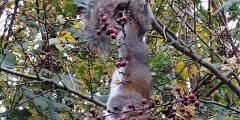Vaccine hesitancy in Europe: A conceptual exploration
March 22, 2024
Many things changed rather fast when the Covid-19 pandemic spread around the world at the beginning of 2020. There were new social phenomena, like ‘social distancing’, a so-called non-pharmaceutical intervention intended to stop the spread of the coronavirus. There were new scientific and bodily phenomena, like quickly developed vaccines, so-called pharmaceutical interventions intended to stop …
Truth, post-truth, and post-fake
February 2, 2024
I was sitting at my desk trying to think about something I could blog about. For some reason the word ‘truth’ popped into my head. After that I engaged in a bit of ‘reading the tea leaves’. That is, I messed about on the news database Nexis, rummaged in the Oxford English Dictionary and looked …
From Omicron to Omega: What’s in a name?
September 22, 2023
The last few years have been years of planetary upheaval. We have all lived through a Covid-19 pandemic and are, in fact, still living with it, and we have all felt the effects of climate change. To deal with these planetary events, we had to invent and learn new concepts and new names. Quite recently, …
Mitochondrial replacement and the pangenome
May 17, 2023
Recently two events caught my attention, which should at least be noted on this blog: the publication of the first human pangenome on 10 May 2023 and the birth of babies through a new human fertilisation technique variously known as mitochondrial donation, mitochondrial transfer, mitochondrial transplant or mitochondrial replacement on 12 May. I’ll say a …
Bridge or Barrier – Does generative AI contribute to more culturally inclusive higher education and research?
May 8, 2023
This post by Dr Dimitrinka Atanasova was initially posted on the LSE Impact Blog on 4 May, 2023. It is cross-posted here with permission. Dr Dimitrinka Atanasova is a Lecturer in Intercultural Communication at Lancaster University. Her research focuses on health & science communication (particularly the topics of obesity, mental health, climate change, sustainability, nitrogen …










